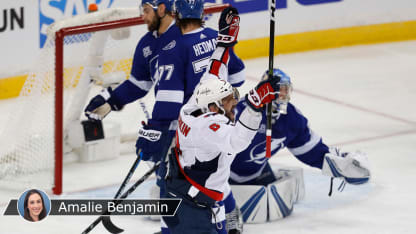The Lightning headed into their dressing room having known what was coming after the face-off, having understood the play the Capitals were going to run, but not being able to do a thing about it. They were down 2-0, and they had an intermission to think about what could have been.
"Any time you give up a goal at the end of the period, it gives momentum to the other team," Lightning captain Steven Stamkos said. "That's just execution. Right off the draw, we know what they're going to do, they're trying to get it to Ovechkin for a shot. We were just a step behind on our reads today."
Alex Killorn tried to get in front of the shot, in front of Ovechkin, but the Lightning forward couldn't quite get there. He saw the puck slide, made his move. It was too late.
"It's a play that we scouted," Killorn said. "We know that it's a play that they do. It just happened so quickly that it's tough to get body position, especially when [Lars] Eller is trying to set a pick there. It's just one of those things where I probably have to jump out quicker on him."
And before he -- and the Lightning -- knew it, the puck had sailed past goaltender Andrei Vasilevskiy.

